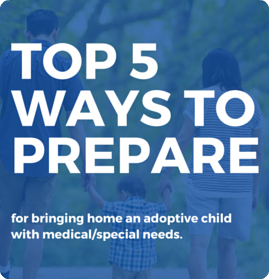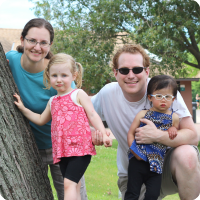 Life with a child with medical or special needs takes extra time, energy, and knowledge. There is a steep learning curve in dealing with the medical, educational, and health insurance systems. It takes planning and coordination to meet your child’s needs and advocate for him or her in these complex systems. My experience as a parent of an adopted child with special needs, and as a professional who works with children with special needs, has given me some insights into this planning and coordination. Here are the top five things you can do to prepare for bringing home your adopted child with medical or special needs:
Life with a child with medical or special needs takes extra time, energy, and knowledge. There is a steep learning curve in dealing with the medical, educational, and health insurance systems. It takes planning and coordination to meet your child’s needs and advocate for him or her in these complex systems. My experience as a parent of an adopted child with special needs, and as a professional who works with children with special needs, has given me some insights into this planning and coordination. Here are the top five things you can do to prepare for bringing home your adopted child with medical or special needs:
1. Find a community to support your family.
The most important thing I wish parents knew is that they are not alone in this journey. As you enter into the world of adoption, you learn that your family becomes part of an adoption community. The same is true of becoming a parent of a child with special needs. You become part of a community of parents who understand the daily struggles of children with special needs and professionals who can guide you to important services. In this community you will find information, advocacy, and guidance.
2. Understand the potential needs of your child’s medical or developmental conditions.
- Talk to your pediatrician.
- Find reliable online resources. The adoption community has several good resources to use as a starting place:
- Connect with local or national groups related to your child’s disability. Parents who have children with similar needs are often your best resources. If you can’t find a local group, there are often Facebook or national support groups with parent resources and networks for support. A few examples include:
- Down Syndrome | Gigi’s Playhouse (multiple locations) and Minnesota Down Syndrome Association
- Deaf and Hard of Hearing | Minnesota Hands and Voices
- Cerebral Palsy | United Cerebral Palsy of Minnesota
3. Create a medical and rehabilitation plan.
While you may not know fully the needs of your child, you can make a tentative plan and increase your awareness resources in your community.
As part of this process, it is helpful to understand the range of professionals, facilities and services you may encounter, such as the following:
- Physicians
- Pediatricians | Doctors trained to work with children.
- Developmental Pediatricians | Doctors trained to work with children with developmental or behavioral concerns.
- Adoption Medicine Clinics | Teams of medical professionals who work with children who are adopted, including international adoptions.
- Specialists related to specific medical needs (e.g. neurologist, geneticist, cardiologist, physical medicine and rehabilitation physician, etc.)
- Each child’s unique medical needs require research and planning to find the best medical care. Invest time in online research, talking to other parents, and consulting with medical providers to find the best fit for your family. There may be an individual doctor you see or a team of specialists. Often this means going to a major medical center near home, but it sometimes means traveling to see a specialist.
- Audiologists | Medical professionals who specialize in checking hearing and the health of ears, assist with hearing aids.
- Ophthalmologists | Medical professionals who specialize in checking vision and health of the eyes, assist with glasses.
- Mental Health and Cognitive Services | Services provided by psychologist, psychiatrist, and other mental health professionals.
- Developmental Assessments | Tests through developmental, neuropsychology, or autism specialty clinics.
- Rehabilitation Therapists
- Physical Therapists | Professionals who focus on development of motor skills.
- Occupational Therapists | Professionals who focus on daily activities such as play, motor, cognitive, and self-care skills.
- Speech Therapists | Professionals who focus on communication disorders (talking and understanding speech).
- There are also specialists who focus on feeding and eating, aural rehabilitation, aquatic therapy, sensory integration, neurodevelopmental treatment, wheelchair positioning and use, and assistive technology and communication devices.
- Durable Medical Equipment/Orthotist | Wheelchairs, walkers, braces, orthotics, prosthetics, communication devices and other medical equipment.
- Additional service providers you are likely to encounter
- Child Life Specialists | Medical professionals who help children cope with the challenges of illness, usually found in hospital settings.
- Interpreter Services | Most major health care providers will provide an interpreter as needed.
Medical and therapy appointments take a lot of time. Many children have on-going needs that require regular check-ins with doctors and several therapy appointments a week. If your child is likely to have surgeries, it is important to consider how to accommodate this within your family. Having flexibility in your work and family life, as well as a strong support system can be very beneficial when parenting a child with medical or special needs. Many families use the Family Medical Leave Act for assistance.
4. Know your health insurance coverage.
Read the full booklet and then call your health insurance company with specific questions related to your child’s potential needs. Watch your explanation of benefits and billing statements to ensure accuracy.
- Be familiar with deductible, co-pays, out-of-pocket maximums, health savings plans, and in- vs out-of-network coverage. (This resource from healthcare.gov is very helpful.)
- Make sure you are able to see the medical team or professional that best meets your child’s needs (check in-network versus out-of-network providers). This is especially true if your child has complex medical needs or a rare medical condition.
- Ask for specifics about the coverage. Key phrase: “Are there any limitations and exclusions?”
- Areas to consider:
- Most plans cover pediatric rehabilitation services (such as physical, occupational, and speech therapy), but have “limitations and exclusions” that can vary greatly. Plans may cover services only for “illnesses or injury” and deny services due to developmental delays. Plans also usually have a limited number of visit they allow.
- What durable medical equipment is covered, and how often.
- Specialized care for hearing (hearing aids or cochlear implants,) vision (eye glasses, vision therapy), and dental care may have additional limits or exclusions.
- Mental health care can also be an area with variable coverage. Be aware this can include conditions such as attention disorders, depression, or behavioral issues.
- Areas to consider:
5. Contact your local school district and begin making an educational plan for your child.
Know who the local contact is in your district prior to bringing your child home so you have a plan in place to initiate services.
Not sure how to find your local district? Try the Help Me Grow website. The Minnesota profile is not linked on the national site, so Minnesota families should check here.
- Children with special needs qualify for individualized education plans (IEPs). Children can qualify based on a medical condition that is known to hinder development or standardized testing showing delays in development. (PACER offers a great overview for Minnesota families.)
- Assessment is free. If you qualify, special education services are free.
- 0-3 year olds have services in-home, 3-5 year olds have services in preschool settings, 5-21 year olds have services within classroom settings.
- Some of the services can include special education teachers, rehabilitation professionals (occupational, physical, and speech therapy), social workers, psychologists and specialist for low vision/blind, hard of hearing/deaf, autism, behavior disorders, assistive technology, adaptive physical education, and physical disabilities.
- Interpreter services can be provided if needed. A child’s limited English language skills should not prevent assessment an initiation of special education services.
- Parent can requests an assessment at any time. Be specific and put your request in writing.
- Services can take several months to set-up, so start early. Earlier is better because younger children qualify for services more easily.
Adopting a child with medical or special needs may take extra time, energy, and knowledge, but it is worth it all when you see your new child thriving in your family. My goal is not to scare anyone away from special needs adoption, but instead to empower through knowledge and support. It may feel overwhelming, but the steps above allow you build a community, gain the knowledge to meet your new child’s need, and find the right profession to help. After many years of working professionally with children with special needs, I had to learn as a mother to ask for help, and by just asking I was lead to wonderful support within the special needs community that has helped me be a stronger parent for my daughter.
I had to learn as a mother to ask for help, and by just asking I was lead to wonderful support within the special needs community that has helped me be a stronger parent for my daughter.
Paige Hays is a mother, an adoptive parent, and a special needs parent. She is an occupational therapist with extensive experience and expertise in working with children who have developmental needs. You can learn more about her and her services for adoptive parents at paigehays.net.


